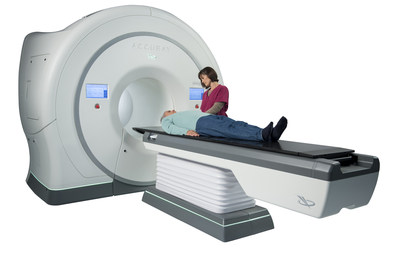Prospective, Multicenter Study Supported by the French National Institute of Cancer Also Demonstrates that Treatment with
the TomoTherapy Platform Resulted in a Significantly Better Cancer-Specific Survival Rate and Post-Treatment Salivary
Function
SUNNYVALE, Calif., July 20, 2017 /CNW/ -- Accuray
Incorporated (NASDAQ: ARAY) announced today that a prospective study conducted at 14 French centers showed the clinical benefits
of intensity-modulated radiation therapy (IMRT) delivered using the TomoTherapy® System over volumetric modulated arc therapy with
RapidArc radiotherapy technology for patients with head and neck cancer. At 18 months, the local control rate and cancer-specific
survival rate were significantly better in the TomoTherapy patient group than in the RapidArc group. The study, the first to
prospectively compare clinical outcomes across radiation therapy platforms, was published online on June
26, 2017 in the peer-reviewed International Journal of Radiation Oncology - Biology - Physics.

The TomoTherapy System is the only radiation system specifically designed for image-guided IMRT. Its TomoHelical™ Mode, used
in this study, provides continuous delivery of radiation beams from 360 degrees around the patient, facilitating the treatment of
the entire spectrum of head and neck tumors, regardless of shape or size or nodal involvement.
"This is the first study to assess whether the method of delivering IMRT impacts the results we are able to achieve. In
previous studies, we showed that TomoHelical was able to deliver radiation dose distributions which precisely conformed to the
shape of the tumor with steep radiation fall-off outside the target," said Jean-Emmanuel Bibault,
MD, MSc, Department of Oncology and Radiotherapy, Georges-Pompidou European Hospital, Paris. "In
this new study, we showed in a prospective, but not randomized manner, that this had a significant clinical impact. Precision and
accuracy are especially important when treating head and neck tumors, where dose outside the desired target may result in damage
to critical structures such as salivary glands, vocal cords, the spinal cord or brainstem. These results should be further
explored in a randomized trial."
The study titled, "Clinical outcomes of several IMRT techniques for patients with head and neck cancer: A propensity score
weighted analysis," provides results for 166 patients. It demonstrated:
- The TomoTherapy System's unique ring-gantry based architecture and fast multileaf collimator, combined with its daily 3D
image guidance, enabled clinicians to deliver a highly conformal and more homogeneous dose, contributing to better local
control and cancer-specific survival rates compared to RapidArc
-
- Further analysis suggests an even greater benefit in the local control of larger tumors and those that have spread to a
high number of lymph nodes
- Treatment with TomoHelical also enabled delivery of significantly reduced doses outside the tumor, leading to better acute
salivary function than with RapidArc
-
- Mouth dryness assessed by the treated patients was worse in the RapidArc group
- Salivary disorders were more frequent in the RapidArc patient group
"This landmark study demonstrates that the technique used to deliver IMRT can have a major impact on patient outcomes. Two key
measures – the local control rate and cancer-specific survival rate – reinforce the TomoTherapy® System's effectiveness in
managing head and neck tumors, results we would also expect to see with the Radixact™ System, our next-generation TomoTherapy
platform. And, importantly, salivary function was compromised after treatment in significantly fewer patients treated with
TomoTherapy, even while they achieved better tumor control," said Fabienne Hirigoyenberry-Lanson, VP Global Medical and
Scientific Affairs of Accuray.
About the Study
Fourteen institutions evaluated 166 patients in this prospective comparative study; 74 were treated using the
TomoTherapy® System and 92 using RapidArc. Randomization was not possible because of unavailability of equipment. Inverse
probability of treatment weighting (IPTW) using the propensity score analysis was undertaken to adjust for potential bias due to
non-randomization. Even before the adjustment the TomoTherapy platform results were better than RapidArc as measured by local
control, cancer-specific survival and salivary function, even though significant differences in several pre-treatment
characteristics may have placed the TomoTherapy group at a disadvantage. Loco-regional control, specific and overall survival
assessed 18 months after treatment were evaluated, as well as long-term toxicity and salivary function.
About Accuray
Accuray Incorporated (NASDAQ: ARAY) is a radiation oncology company that develops, manufactures, and sells precise,
innovative tumor treatment solutions that set the standard of care with the aim of helping patients live longer, better lives.
The company's leading-edge technologies deliver the full range of radiation therapy and radiosurgery treatments. For more
information, please visit www.accuray.com
Safe Harbor Statement
Statements made in this press release that are not statements of historical fact are forward-looking statements and
are subject to the "safe harbor" provisions of the Private Securities Litigation Reform Act of 1995. Forward-looking statements
in this press release relate, but are not limited, to clinical applications, clinical results, patient outcomes and Accuray's
leadership position in radiation oncology innovation and technologies. Forward-looking statements are subject to risks and
uncertainties that could cause actual results to differ materially from expectations, including but not limited to the risks
detailed from time to time under the heading "Risk Factors" in the company's report on Form 10-K, filed on August 24, 2016, the company's reports on Form 10-Q, filed on November 1, 2016,
February 3, 2017, and May 5, 2017, and as updated periodically with
the company's other filings with the SEC.
Forward-looking statements speak only as of the date the statements are made and are based on information available to Accuray
at the time those statements are made and/or management's good faith belief as of that time with respect to future events. The
company assumes no obligation to update forward-looking statements to reflect actual performance or results, changes in
assumptions or changes in other factors affecting forward-looking information, except to the extent required by applicable
securities laws. Accordingly, investors should not put undue reliance on any forward-looking statements.
Media Contacts:
Beth Kaplan
Public Relations Director, Accuray
+1 (408) 789-4426
bkaplan@accuray.com
Jane Hauser
MSLGROUP
+1 (781) 684-0770
accuray@mslgroup.com
SOURCE Accuray Incorporated

View original content with multimedia: http://www.newswire.ca/en/releases/archive/July2017/20/c3767.html